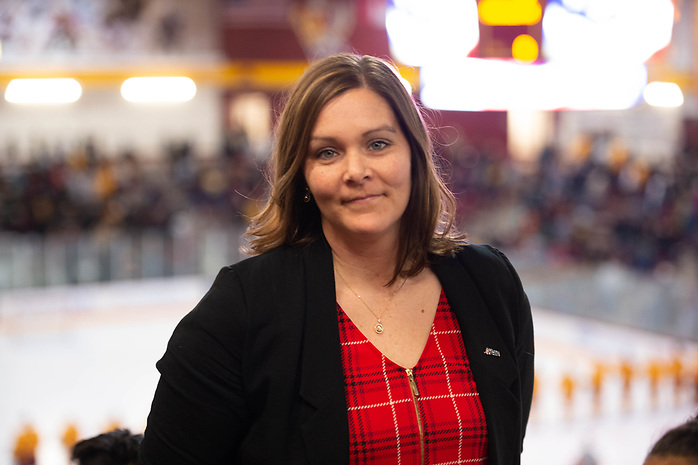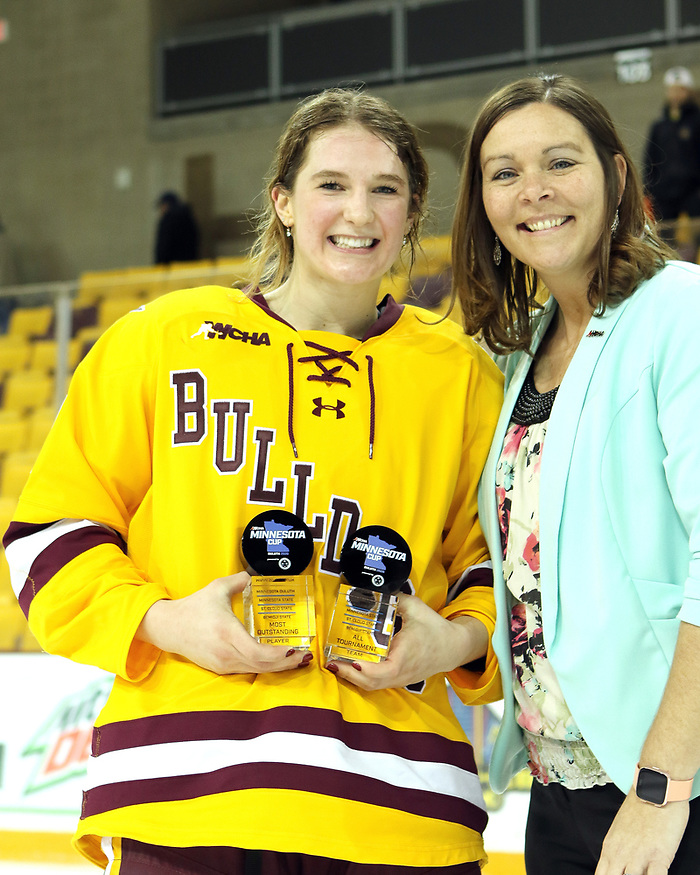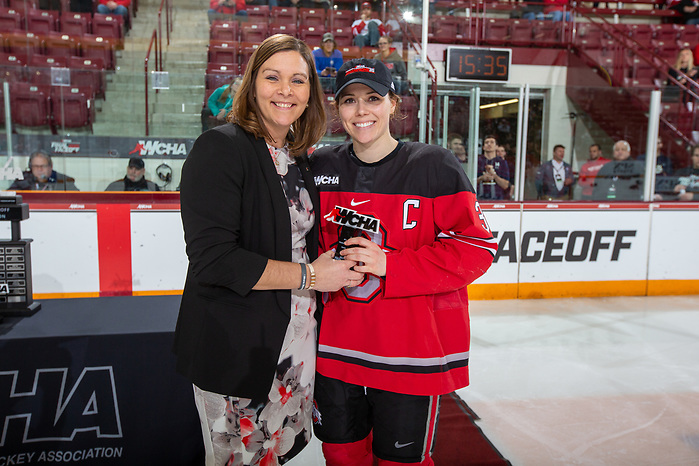
It has been an unprecedented first year on the job for WCHA Women’s Commissioner Jennifer Flowers. In her first 12 months, she has presided over more upheaval than many administrators see in their whole career.
When she was announced as the successor to Katie Million on June 3, 2019, it seemed like she was advancing her career by stepping up to lead a successful, historic league. She was excited at the opportunity “to be the leader; to be the number one.” It felt like the right time to step into her own space after spending much of her career as someone else’s second-in-command.
Flowers had served as the Assistant Commissioner for Membership Services of the Division II Northern Sun Intercollegiate Conference for three years before taking the WCHA position. In that role, she had worked with four WCHA member institutions – Bemidji State, Minnesota Duluth, Minnesota State and St. Cloud State. Despite never having worked in hockey before, Flowers felt the relationships she had built with those schools would help her to understand what would be needed of her in this new role.
“Really having the opportunity to focus on one sport, one group of young women – that that was kind of what sold the whole deal for me,” she said.
Before she had her first day, Flowers found herself wondering if taking the job was the right decision. Less than a month after her hiring was announced and before she officially signed the contract and started work, news broke that seven of the 10 men’s ice hockey teams in the WCHA were exploring leaving the conference to form their own, new conference.
Having never worked in hockey before, Flowers was hoping to spend the early days in her new role getting to know the players, coaches and institutions that comprise the women’s WCHA. Instead, her first contact with many of the members of the league were phone calls reassuring them about the stability of the women’s side and having conversations about what those members would like the future of the women’s WCHA to look like.
“Maybe it’s my newness to the game of hockey, but I had no idea that that was even being talked about, (but) I recognized that this may be an incredibly unique opportunity for the women’s league to really step away and stand alone, if that’s how it was gonna play out long term. We’re the only league in the country run the way that we are, with a men’s commissioner and a women’s commissioner. We have the opportunity to potentially be a women’s only league,” said Flowers.
The possible folding of the men’s side of the WCHA led to a vast array of questions and scenarios as to what would happen on the women’s side, but Flowers said she quickly learned from coaches, players and other stakeholders at the women’s hockey member institutions that they were committed to remaining as they’d been – under the WCHA banner.
“It became very clear that our membership resonates with the four letters. The WCHA means a lot to our league, and our coaches don’t want to lose that. There’s a lot happening on the (men’s side). There are obviously a lot of questions still related to the men’s side and what that may or may not look like but regardless, our women’s league is moving forward and if we have the opportunity to step out on our own and really embrace our own brand, we’re excited to do that.”
Though it was one of the most difficult ways to imagine starting a new role, ultimately Flowers felt like having the shakeup come when it did mean that she was able to have a lot of outside perspective.
“Change comes naturally when you change leadership. It still feels to me like this is really kind of a blessing in disguise that timing is happening the way it’s happening. If you’re going to change, you may as well change right away. I think it would be harder, honestly, for me to lead through change later as maybe I got myself established. I think it’s kind of been a blessing, because it’s allowing all of the doors to come unhinged at the same time, and let’s really push through and make as much change as we can in a strategic and innovative way, but let’s do it while we’re all while we’re already embracing change,” she said.
The collapse on the men’s side necessitated conversations and reckoning that may have been difficult under other circumstances, especially for a new commissioner who would have been careful about rocking the boat and overstepping. Instead, the conversation was already on the table. Flowers visited each of the six WCHA women’s schools early on in her role to make face-to-face connections and reassure everyone about the stability of the women’s side. She was also able to talk to coaches, staff and players about their thoughts on what the future of the women’s league would look like and she said she found that everyone was committed to the future of the women’s WCHA, regardless of what happened on the men’s side.

“I think it’s really allowed and kind of forced our women’s league to tighten up a bit, and to really start thinking bigger and thinking ahead as opposed to maybe just working in the day to day and working in the year to year. I think it’s actually provided us a really unique opportunity to grow in a different way than we probably would have if this hadn’t happened,” said Flowers.
Since the University of North Dakota cut their women’s hockey program in 2017, the Women’s WCHA has had seven members, which most everyone agrees is not ideal. Expanding the conference is Flowers’ primary focus.
“(The goal) is really to solidify our membership and strategically put ourselves in place of growth. My biggest goal for us right now is the membership piece and solidifying ourselves at eight. I think always being on the lookout for more growth is never bad. There’s always ways to adjust. I have people who say ‘eight’s the number. We don’t want to be more than eight.’ But the reality is as the landscape across college athletics changes, I think we have to always be prepared to be looking at membership,” she said.
Though it’s a priority, Flowers’ hand has been forced a bit on the topic of expansion thanks to the saga of the University of St. Thomas, a Division III school that was involuntarily booted from their conference and is seeking NCAA dispensation to make the leap from Division III to Division I. The school has been offered membership in the Summit League, but that league does not support men’s or women’s hockey. The Tommies would be looking for a home for those programs and geographically, the WCHA would make sense.
But the move isn’t that simple. First, the NCAA would have to allow it and thanks to COVID-19, the Division I Board of Directors Meeting where that vote would take place has been postponed. Beyond that, the WCHA will have to decide whether adding the program is the right move from a number of different angles. Should St. Thomas receive permission, it would likely take a minimum of six months to figure out the logistics of where the program’s men’s and women’s teams will play.
“You have this plan – at least I had a plan for how to get through this first spring and how to really lead in the year two, and then the pandemic happens and it really has forced all of us to alter plans and try to figure out how to still accomplish and achieve the things you wanted to do, just differently,” she said.
When the WCHA gathered in Minneapolis at their conference tournament the weekend of March 6-8, there were a few jokes about not shaking hands, but no Covid-related precautions were taken. No state or city mandates were in place. There were some snarky comments as everyone dispersed on Sunday about how eveyrone hoped to see each other in Boston in two weeks for the Frozen Four. Just the tiniest bit of worry had seeped in, but no one seemed to take it very seriously. None of the folks who spent the weekend together inside Minnesota’s Ridder Arena could have imagined that 100 or so hours later, all NCAA winter and spring championships would be cancelled.
It started slowly, with a small number of programs announcing on Monday, March 9 that they would play their scheduled games the upcoming weekend in empty arenas. Men’s hockey was in conference tournament preliminaries while the women were headed into NCAA quarterfinals. By Thursday morning, most every program was still planning to play, but with only necessary personnel in the building. In Boston, early talks were of how to hold video post-conferences for the Frozen Four if the NCAA wouldn’t allow press in the building.
But just as most programs were sitting down to dinner on Thursday, March 12, the NCAA announced that it was cancelling the end of the winter and spring seasons, effectively immediately. Clarkson’s women’s hockey team was already en route to Madison, having traveled commercially in two different groups through Montreal, Canada. Many student-athletes were already in New Mexico for the Indoor Track and Field Championships scheduled to start on Friday, March 13.
It was a sudden, abrupt end to the women’s hockey season that was so close to finishing. And it was as chaotic a finish to Flowers’ first season as the start had been.
From a business standpoint, that the shutdown came after the conference tournament completed was a best-case scenario for the WCHA. They were able to fulfill all their sponsorship responsibilities and had more or less come to the end of their financial year.
Business aside, Flowers said she’s thrilled the league was able to finish their tournament and crown a champion – especially since it was the first-ever conference tournament title for Ohio State.

“Without a doubt the Final Faceoff and how it all came together – that will forever be the highlight of my first year,” she said. “For me, in a perfect world, we would see all of our teams win the championship at some point. That’s what you hope for as a league commissioner, that you find the balance in your league.”
There’s no precedent for the times we’ve been living in the past three months and Flowers knows there’s no right answer for how to handle it, both from a personal and professional perspective.
There are pages of contingencies being considered for when collegiate athletics will resume and what that timeline might look like for women’s hockey. In the WCHA, with schools spread across a wide geographical swath and few nearby non-conference options, a condensed schedule is likely. Travel concerns may force teams to bus to each of their games, but longer trips could mean student-athletes missing more class time.
“There’s no road map. We’re all just waiting day by day like everyone else and that’s a really strange place to be,” she said. “From a league office perspective, I think we’re very much trying to keep our focus on what we would have been accomplishing (under normal circumstances).”
That means Flowers is thinking about what she’d like to accomplish in her second year at the helm. The learning curve was steep and there are still plenty of unknowns, but what she is sure about is how solid and successful her league is. Three WCHA teams – Minnesota, Ohio State and Wisconsin – would have received bids into the eight-team NCAA tournament and a fourth – Minnesota Duluth – finished the season ranked eighth in the USCHO poll.
Though the conference has a storied history of on-ice success, Flowers hopes to highlight the accomplishments of the WCHA’s student-athletes and universities away from the game.
“They each have a story to tell. They are simply amazing. We ask so much of them. Finding ways to really celebrate them and tell their stories (is so important),” she said. “You say WCHA women’s hockey and most people instantly think of the on-ice success, which is phenomenal. But off of the ice… it is so rewarding for me to be the person leading them because I’m so proud of what they’re doing. That’s the story that I want to really grow into telling.”
Within the women’ hockey world, Flowers knows the WCHA has name recognition. And the tumult that happened with the men’s league taught her how important the league’s identity is to the players, coaches, staff and member institutions. But she knows there’s work to be done to help push the growth of women’s hockey even further. And she wants her conference to be the one that people are paying attention to.
“I want to expose and establish our league to as many people as I can, and to be sure that the average fan across the country knows WCHA women’s hockey and what’s so awesome about us.”


